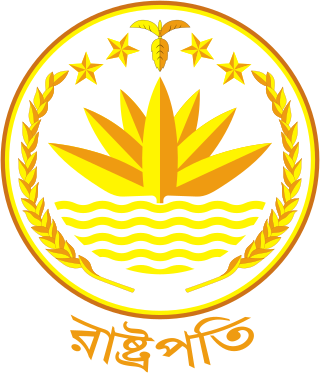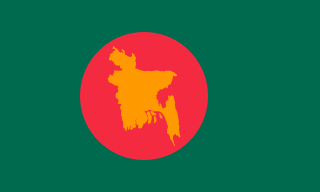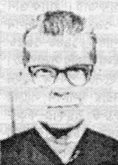Related Research Articles

Politics of Bangladesh takes place in a framework of a parliamentary representative democratic republic, whereby the Prime Minister of Bangladesh is the head of government, and of a multi-party system. Executive power is exercised by the government. Legislative power is vested in both the government and parliament. The Constitution of Bangladesh was written in 1972 and has undergone seventeen amendments.

Sheikh Mujibur Rahman was the founder of Bangladesh. He first served as the titular president of the Provisional Government of Bangladesh between April 1971 and January 1972. He then served as Prime Minister of Bangladesh from the Awami League between January 1972 and January 1975. He finally served as President again during BAKSAL from January 1975 till his assassination in August 1975. In 2011, the 15th constitutional amendment in Bangladesh referred to Sheikh Mujib as the Father of the Nation who declared independence; these references were enshrined in the fifth, sixth, and seventh schedules of the constitution.

The President of Bangladesh officially the president of the People's Republic of Bangladesh is the head of state of Bangladesh and commander-in-chief of the Bangladesh Armed Forces.
Mohammad Mohammadullah was the third president of the People's Republic of Bangladesh. Mohammadullah became the Acting President on 24 December 1973, was elected president on 24 January 1974, and took oath of office on 27 January 1974. He remained President until 25 January 1975.

Khondaker Mostaq Ahmad was a Bangladeshi politician. He was the fourth president of Bangladesh from 15 August to 6 November 1975, after the assassination of Sheikh Mujibur Rahman. He was involved in the assassination of Bangabandhu Sheikh Mujibur Rahman on 15 August 1975. He took on the role of president immediately after the assassination, praised the assassins as "sons of the sun" and put cabinet ministers loyal to Sheikh Mujibur Rahman in jail.

Bangladesh Krishak Sramik Awami League (BaKSAL) (Bengali: বাংলাদেশ কৃষক শ্রমিক আওয়ামী লীগ, English: Bangladesh Worker-Peasant's People's League; বাকশাল) was a political front comprising Bangladesh Awami League, the Communist Party of Bangladesh, the National Awami Party (Muzaffar) and Jatiyo League.
Syed Faruque Rahman was a coup member involved in toppling the Sheikh Mujib regime in Bangladesh. He was convicted and hanged on 28 January 2010 along with co-conspirators Sultan Shahriar Rashid Khan, A.K.M. Mohiuddin Ahmed, Mohiuddin Ahmed, and Mohammad Bazlul Huda in Dhaka Central Jail, Old Dhaka, for the murder of Sheikh Mujibur Rahman, the founder and first President of Bangladesh. Syed Faruque Rahman and his close ally Khondaker Abdur Rashid were the chief organisers of the assassination of Sheikh Mujibur Rahman on 15 August 1975. He was 2IC of the 1st Bengal Lancers Regiment of the Bangladesh Army who led a group of junior army officers in-order to overthrew the regime of Sheikh Mujibur Rahman and installed Khondaker Mushtaque Ahmed as President of Bangladesh.

The Jatiya Rakkhi Bahini was a Bangladeshi para-military force formed in 1972 by the Sheikh Mujibur Rahman government.

Ataur Rahman Khan was a Bangladeshi lawyer, politician and writer, and served as Chief Minister of East Pakistan from 1 September 1956 – March 1958, and as the Prime Minister of Bangladesh from 30 March 1984 to 9 July 1986.

The history of Bangladesh (1971–present) refers to the period after the independence of Bangladesh from Pakistan.

The independence of Bangladesh was declared on 26 March 1971, at the onset of the Bangladesh Liberation War by Bangabandhu Sheikh Mujibur Rahman; the following day the declaration was broadcast by Major Ziaur Rahman in a radio broadcast. On 10 April, the Provisional Government of Bangladesh issued a proclamation on the basis of the previous declaration and established an interim constitution for the independence movement.

The 7 March Speech of Bangabandhu was a public speech given by Sheikh Mujibur Rahman, the Founding Father of Bangladesh on 7 March 1971 at the Ramna Race Course in Dhaka to a gathering of over two million (2,000,000) people. It was delivered during a period of escalating tensions between East Pakistan and the powerful political and military establishment of West Pakistan. In the speech, Bangabandhu informally declared the independence of Bangladesh, proclaiming: "The struggle this time, is a struggle for our liberty. The struggle this time, is a struggle for our independence." He announced a civil disobedience movement in the province, calling for "every house to turn into a fortress".

The Provisional Government of Bangladesh, popularly known as the Mujibnagar Government, was a provisional government that was established following the declaration of independence of East Pakistan as Bangladesh on 10 April 1971. Headed by prime minister Tajuddin Ahmad, it was the supreme leadership of the Bangladeshi liberation movement, comprising a cabinet, a diplomatic corps, an assembly, an armed force, and a radio service.
The second Mujib cabinet was the first government of sovereign and independent Bangladesh. After independence, on 12 January 1972, Sheikh Mujibur Rahman assumed office as the second Prime Minister of Bangladesh and left office on 16 March 1973.
Mashiur Rahman (1920–1971) was a Bangladeshi lawyer and politician, a member of the East Bengal Legislative Assembly and cabinet minister in the East Pakistan government of Ataur Rahman Khan. He was instrumental in the founding of the Bangladesh Awami League and in the Bengali Language Movement, and supported Sheikh Mujibur Rahman.
Second Revolution was a political hypothesis presented by the "founding father" of Bangladesh, Sheikh Mujibur Rahman. The hypothesis included a series of reforms in the three pillars of a state: administrative, judiciary and legislative systems. The reforms were enacted through the fourth amendment of the constitution of Bangladesh. BaKSAL was formed as the decision making council to carry out the revolution.

Phani Bhushan Majumder was an Awami League politician and a former minister of the government of Bangladesh.

Abdul Mannan was a Bangladesh Awami League politician and the first Minister of Home Affairs of independent Bangladesh from April 1972 to March 1973.

The premiership of Sheikh Mujibur Rahman began on January 12 of 1972 when he was sworn in as the Prime Minister of Bangladesh after briefly serving as the President after returning from Pakistan's jail on January 10, 1972. He served as the Prime Minister of Bangladesh until January 25, 1975, for three years, and later led the parliament to adopt an amendment of the constitution that made him the President of Bangladesh, effectively for life.
References
- ↑ "Sheikh Mujibur Rahman, 1972-75". GlobalSecurity.org.
- ↑ "Life and Struggle of Bangbandhu Sheikh Mujibur Rahman". Bangladesh Awami League. 19 December 2017.
- ↑ Craig Baxter; Syedur Rahman (2003). Historical Dictionary of Bangladesh (Third ed.). Lanham, Maryland: Scarecrow Press. pp. 206–210. ISBN 0-8108-4863-5.
- 1 2 "Mujib Takes Four More Cabinet Posts". Waterloo Daily Courier. Waterloo, Iowa. Associated Press. 31 January 1972.

- 1 2 3 "Bangladesh Shakeup". The Canberra Times. Australian Associated Press-Reuter. 10 July 1974.
- 1 2 3 4 5 "Ministers quite as Mujib gets tough". New Straits Times. Singapore. Reuter. 9 July 1974.
- ↑ "Minister quits". The Montreal Gazette. Associated Press. 18 May 1973.
- ↑ Ahmed, Sharif Uddin (1999). Sylhet: History and Heritage. Bangladesh Itihas Samiti. ISBN 978-984-31-0478-6.
The post of C-in-C in Bangladesh Army was abolished on 7 April 1972 and he retired from the army for the second time. On 12 April, he became the Minister of Shipping, Inland Water Transport and Airways.
